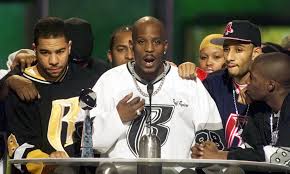🎤 DMX: The Life, Legacy, and Legend of a Hip-Hop Icon
Explore the life and career of DMX—from his troubled beginnings to his chart-topping success, personal struggles, and lasting legacy in music and film.
📌 Contents
- Early Life
- Musical Career
- Personal Life
- Legal Issues
- Health Problems and Death
- Legacy
- Discography
- Awards and Nominations
- Filmography
🔥 Early Life
Born Earl Simmons on December 18, 1970, in Mount Vernon, New York, DMX grew up in Yonkers in a turbulent household. Raised by a single mother, Earl’s early life was marked by poverty, abuse, and time spent in group homes. He turned to dogs for companionship—forming a bond that would become symbolic throughout his music and image. Despite being deeply misunderstood and frequently in trouble, he found escape in writing, beatboxing, and rhyming—laying the foundation for what would become a monumental hip-hop career.
🎶 Musical Career
DMX exploded onto the scene in 1998 with his gritty debut album It’s Dark and Hell Is Hot, featuring tracks like “Ruff Ryders’ Anthem” and “Stop Being Greedy.” The album was both critically acclaimed and commercially successful, debuting at No. 1 on the Billboard 200.
Astonishingly, he released Flesh of My Flesh, Blood of My Blood later the same year—also debuting at No. 1—solidifying his spot as one of rap’s most dominant forces.
His rugged delivery, growls, and deeply introspective lyrics made him stand out in an era defined by polished production. DMX went on to release seven studio albums, including classics like …And Then There Was X and The Great Depression, earning multi-platinum certifications along the way.
❤️ Personal Life
DMX was a father to 15 children and known for his strong Christian faith, often including heartfelt prayers in his albums and live shows. He balanced his street persona with moments of vulnerability, faith, and deep introspection, connecting with fans on a spiritual level. Despite his fame, he remained deeply rooted in his experiences, often visiting the communities he came from.
⚖️ Legal Issues
Throughout his life, DMX had frequent run-ins with the law—ranging from drug possession and tax evasion to probation violations. These issues often interrupted his music and acting career, but he remained transparent about his struggles with addiction, poverty, and trauma. His legal troubles were not just tabloid headlines—they were real battles for a man shaped by hardship.
🏥 Health Problems and Death
DMX struggled with substance abuse for much of his life. On April 2, 2021, he suffered a heart attack reportedly triggered by a drug overdose. After being hospitalized in a coma for several days, he passed away on April 9, 2021, at the age of 50. His death sent shockwaves across the music world, with fans and artists alike mourning the loss of a lyrical warrior and spiritual leader.
🌟 Legacy
DMX left behind more than just hit records—he left a blueprint for honesty in hip-hop. He was unapologetically himself: vulnerable, fiery, faith-driven, and raw. From influencing the likes of Kendrick Lamar and Meek Mill to being immortalized in memes and motivational quotes, his voice continues to echo through music, culture, and beyond.
His memorial at the Barclays Center in Brooklyn, attended by thousands, proved that DMX wasn’t just a rapper—he was a movement.
🎧 Discography
- It’s Dark and Hell Is Hot (1998)
- Flesh of My Flesh, Blood of My Blood (1998)
- …And Then There Was X (1999)
- The Great Depression (2001)
- Grand Champ (2003)
- Year of the Dog… Again (2006)
- Undisputed (2012)
- Exodus (2021, posthumous release)
🏆 Awards and Nominations
- American Music Award for Favorite Rap/Hip-Hop Artist (2000)
- Multiple Billboard Music Awards
- Grammy-nominated artist for tracks like “Party Up (Up in Here)” and “Who We Be”
- Recognized by BET, MTV, and Soul Train for his influence on the culture
🎬 Filmography
DMX also had a notable acting career, often playing roles that reflected his raw energy and emotion:
- Belly (1998)
- Romeo Must Die (2000)
- Exit Wounds (2001)
- Cradle 2 the Grave (2003)
- Never Die Alone (2004)
He brought the same intensity to the screen that he did on the mic—cementing his role as a crossover icon.
✊ Final Word
DMX wasn’t just a part of hip-hop—he was hip-hop. Flawed but fearless, broken but brilliant, his legacy will forever live on in the streets, in the studios, and in the souls of fans who found healing through his words.
Rest in power, Earl Simmons. 💔🐶🔥
#DMXForever #HipHopLegend #RuffRyders #RestInPowerX #DMXLegacy #9jazicTribute
